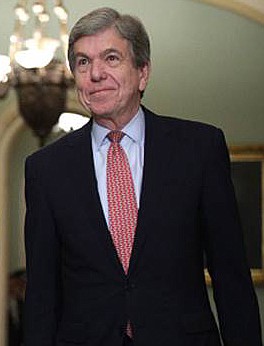U.S. Sen. Roy Blunt told members of the Missouri House of Representatives on Wednesday that these days are "a particularly good time for the economy in our state and the country."
He noted Missouri's overall unemployment rate is 3.2 percent, and said some parts of the state have an unemployment rate below 2 percent.
"I've been meeting - particularly over the last six months - with people trying to connect the workplace needs with the people available to do that work," Blunt told Representatives. "I have heard for a long time, as many of you have, (that) 'we have job openings, but we don't have the skills for those openings.'"
Historically, a 4 percent unemployment rate is considered to be "full employment."
Where once the emphasis was on going to college, Blunt said, now the national emphasis is finding people willing to do all kinds of jobs that don't necessarily require a college education.
He said there's a greater emphasis on having skills needed by a wide variety of businesses and industries in the state and nation.
"If you're getting out of prison or jail right now with skills, you have a better chance of going to work than you've had in decades," Blunt said. "If you've been fired from a job in the past, you have a better chance of being asked to come back to work than you have in a long time."
Every month for the last year, the Missouri Republican told state lawmakers, "there were more jobs available than there were people looking for work. People think there's a better chance of being promoted than of losing a job."
He told the House that government needs to do more to "create a greater sense, early, for people of the kind of job they might want to have, (of) what fulfills (them) as a person."
He noted many of today's jobs - even well-paying jobs - don't require a college degree.
For many of the business leaders he's visited with, Blunt said, "they were trying to get people just ready to fill the jobs out there."
About 30 years ago, there was a bigger push to get students to go to college after high school.
However, in a news conference following his speech, Blunt said some things have changed.
"I'm the first person in my family to graduate from college, so I am for a college education," the former college president said. "I'm for that power of the certificate when you walk across the stage and get it - and the example to others. If there has been a change, (it's) probably been the opportunity of jobs that don't, necessarily, need that college degree - but need the skill-set you need to get that job."
He said he talks more about what the federal government needs to be doing, without giving state lawmakers advice about what they should be doing.
Still, during his speech, he encouraged lawmakers to help Missouri be more friendly to military veterans and their families.
"If you've been driving a truck for three years in the military, it shouldn't be very difficult for you to, immediately, get a commercial driver's license in your hand," he said. "If you're a medical technician, it shouldn't be difficult for you to take that into the workplace and use that."
Blunt encouraged the lawmakers to support steps to make it easier for veterans - or the spouses of active military people - to get jobs in Missouri.
He noted the Missouri Bar had already allowed the wife of a military officer to be sworn in as a member of the bar, so she could practice law in the state while her husband is stationed here.
Blunt said the U.S. Air Force secretary recently told him that military officials look for "high quality schools and (good) jobs for spouses, that recognize the spouse's skills," as the U.S. military transfers people to new posts around the country and the world.
"We want to think about how we make this 'the' state," he said, "where people want to take the skills they have and move here."
As part of the effort to make Missouri more attractive, Blunt said, government should concentrate on technology improvements, especially for the state's rural areas.
"Broadband is as important in the next decade as the telephone was 50 years ago," he said. "We have to make the same commitment, that people have access to high-speed broadband."
The quality internet access that broadband provides, he said, will improve rural residents' access to telemedicine and tele-behavioral health services, among other things.
"Fifty-one percent of rural Missourians don't have access to high-speed broadband," Blunt noted, acknowledging it's still a new technology and the state has time to improve that access.

